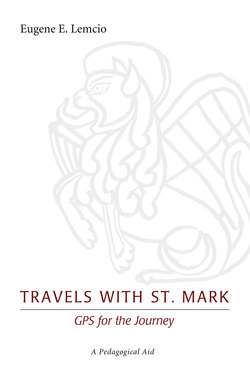Читать книгу Travels with St. Mark: GPS for the Journey - Eugene E. Lemcio - Страница 7
На сайте Литреса книга снята с продажи.
1. Politics. Human and Divine in Daniel
Оглавление| 1 | 2 | 3 | 4 | 5 | 6 | 7 | 8 | 9 | 10 | 11 | 12 | Totals | |
| Kingdom | 3 | 10 | 3 | 11 | 7 | 7 | 9 | 1 | 3 | 6 | 62 | ||
| King | 17 | 43 | 29 | 15 | 17 | 26 | 3 | 5 | 2 | 4 | 23 | 184 | |
| Reign (vb.) | 2 | 1 | 1 | 4 | |||||||||
| Authority | 3 | 8 | 4 | 1 | 6 | 22 | |||||||
| Power(ful) | 1 | 2 | 1 | 1 | 2 | 3 | 9 | ||||||
| Ruler | 1 | 2 | 3 | 1 | 1 | 8 | |||||||
| Throne | 1 | 4 | 2 | 7 | |||||||||
| 21 | 56 | 41 | 39 | 28 | 35 | 23 | 32 |
1. Because Daniel supplies so many of the key themes and terms in the Synoptic Gospels (and in Revelation, for that matter), I display the data and provide the following observations and questions. Although textual variants in some cases affect the numbers, they do not contradict the overwhelming preponderance of the figures above.
2. The best way to reduce (if not completely avoid) subjectivity about determining the dominant theme of any literary work is to apply the criterion of frequency. Which terms and synonyms occur in most instances, at certain concentrations, and at critical junctures? This display indicates how much political terminology (both separately and collectively) covers the text.
3. As a working definition, regard politics to be an understanding of power and as a strategy for distributing it in human community. In the Bible, there are only two alternatives: human politics and divine politics. The latter is summarized especially by a multiple refrain at 4:17, 25, and 32: “The Most High rules human kingdoms and gives them to whom he will” and, according to v. 17b, “sets over it the lowliest of human beings.” According to the LXX of 4:28(31), Daniel tells King Nabouchodonosor, “The kingdom of Babylon has been taken away from you and is being given to another, a contemned [or “despised”] person in your house. Lo, I establish him over your kingdom, and he will receive your authority and your glory and your luxury so that you may recognize that the God of heaven has authority in the kingdom of humans and he will give it to whomever he desires. Now, by sunrise, another king will rejoice in your house and will take your glory and your power and your authority” (NETS).
4. The numbers represent Greek terms as they occur in the LXX, the Bible most often cited and alluded to by the writers of the NT. A comparison with Semitic and English concordances does not materially affect the quantity and distribution of the terms. All such reference works testify to the heavily political context of the writer’s various themes. The quantity and variety of instances for royal terminology are themselves impressive. Can there be any doubt that dominion and rule are dominant themes in this book?
5. Regard the throne as the “seat” of power from which kings rule. In the extended chapter 4 in the LXX of Daniel, the throne imagery is increased severalfold. This is more apparent in the NETS.
6. Perhaps the clearest definition of Israelite kingship (at least its ideal) is provided by Deut 17:14–20. Distinguish between negative and positive aspects of the job description. See also Psalm 72.
